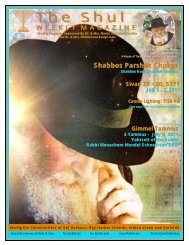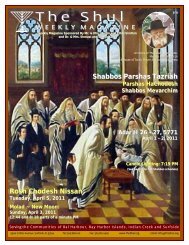Create successful ePaper yourself
Turn your PDF publications into a flip-book with our unique Google optimized e-Paper software.
Inspiration, Insights & Ideas<br />
Bringing Torah lessons to LIFE!<br />
reward." The Torah commands us to obey G-d's will; the Ethics<br />
wants us to "make that your will should be as His will."<br />
In other words, while the other sixty-two tractates of the Talmud<br />
concern themselves primarily with the "law"--the do's and don'ts of<br />
the Torah's commandments--the Ethics is wholly devoted to the<br />
conduct of the one whom the Talmud calls a chassid: one who takes<br />
these laws to the next level, going beyond what is mandated as his<br />
or her moral duty. The chassid is not content with fulfilling the<br />
"body" of the law; he desires its "soul," its inner spiritual truth, even<br />
if, technically, he's not "obligated" to go that far.<br />
The "body" of Torah is a set of actions. The "soul" of Torah is the<br />
deeper significance of those actions-- the inner purpose they<br />
achieve.<br />
The connection between the Torah's "body" and it's "soul" is<br />
emphasized in the opening lines of the Ethics' first chapter, which<br />
reads:<br />
Moses received the Torah at Sinai and gave it over to Joshua; Joshua<br />
[gave it over] to the Elders, the Elders to the Prophets, and the<br />
Prophets gave it over to the Men of the Great Assembly....<br />
Why does the Ethics begin by describing the Torah's "chain of<br />
tradition"? The commentaries explain: The rules, laws and<br />
regulations contained in the rest of the Talmud were obviously<br />
commanded by G-d at Sinai. But when it comes to the pietistic<br />
sayings of the Ethics, one might think that these are "personal"<br />
teachings of the sages in whose names they are quoted. Thus the<br />
Ethics emphasizes that these, too, form an integral part of the<br />
Sinaic tradition. Indeed, they are the soul of the laws--their inner<br />
expression, their ultimate fulfillment.<br />
When creating the first man and woman (as described in Genesis<br />
2:7) G-d first formed a body out of the "dust of the earth" and then<br />
"blew into its nostrils the soul of life." Similarly, the Talmud<br />
describes all subsequent creations of human life: a body is formed<br />
in the mother's womb, into which a soul is infused from on high.<br />
The same is true of the body and soul of Torah. First comes the<br />
grounding of a moral life--an existence governed by the rules, laws<br />
and regulations of the right path. Then, the chassid breathes life<br />
and spirit into this body, uncovering the "beyond" that lies within.<br />
But first must come the body; for a soul without a body is but a<br />
ghost, a disembodied spirit with neither grasp of, nor effect upon,<br />
the terrain of reality.<br />
In this context, we can understand Rabbi Judah HaNassi's saying:<br />
"Which is the right path for man to choose for himself? Whatever is<br />
harmonious for the one who does it, and harmonious for other<br />
people."<br />
The "right path," obviously, is the path of Torah. But there are two<br />
ways a person can tread this path: he can walk it as a stranger, or he<br />
can chose it as his own.<br />
The body of the law is fulfilled by simply walking the path. It may be<br />
difficult and uncomfortable. It may be a lonely path, scorned by<br />
society and a burden even to those who walk it. But as long as they<br />
obey its signposts and remain true to its trajectory, they have<br />
fulfilled their duty to G-d and man.<br />
But the chassid wants more. He wants the soul. He says to himself:<br />
if this is the right path, why don't I desire it with every fiber of my<br />
being? If this is the right path, why doesn't all the world recognize it<br />
Parsha Messages<br />
15<br />
as such? Obviously, there is much about myself that requires<br />
improvement and development. Obviously, there is much about my<br />
world that requires improvement and development.<br />
But the chassid also knows that to attain the soul, he must first<br />
attain the body. To chose the path, he must first walk the path. To<br />
make that the path should be in harmony with his wiles and desires,<br />
he must first subordinate his wiles and desires to its law. To make<br />
that the path should ultimately be in harmony with all inhabitants<br />
of earth, he must first commit to it despite its unpopularity.<br />
The chassid knows that life's journey has two chapters. In Chapter<br />
One, Moses receives the Torah at Sinai and hands it over to Joshua,<br />
and to all subsequent generations, as the divinely ordained path of<br />
life. In Chapter Two, this right path is chosen as harmonious for the<br />
one who does it, and harmonious for all mankind.<br />
<br />
Six Days Shall Work Be Done<br />
By Yitschak Meir Kagan<br />
T<br />
his week's Torah reading, <strong>Emor</strong>, contains the following<br />
command pertaining to the Shabbat: "Six days shall work be<br />
done, but the seventh day is a Shabbat of rest... you shall do<br />
no manner of work" (Leviticus 23:3.)<br />
How meaningful are even the most simply worded of G-d's<br />
commands! In fact, there is significance even in the sequence and<br />
order of the Torah's words concerning the Shabbat day. First the<br />
Torah commands us to work for six days and then we are<br />
commanded to rest on the seventh.<br />
The calendar week begins on Sunday. Prevalent custom has<br />
designated this first day as a day of rest with the working week<br />
following. The Torah, however, sets the working week first, to be<br />
followed by the day of rest, the holy Shabbat. "Six days shall work be<br />
done" and only then "the seventh day is a Shabbat of solemn rest" --<br />
the exact reverse of general practice. The precedence of labor before<br />
rest indicates that the purpose of man on earth is not to while away<br />
his time indolently, but to work for his spiritual as well as his own<br />
material welfare and for that of his community.<br />
Immediately following the creation of Adam, the Torah states: "And<br />
the L-rd G-d took Adam, and placed him in the Garden of Eden to<br />
work it and guard it" (Genesis 2:15). The meaning of the verse is as<br />
follows: it is G-d's will that man work to develop within himself the<br />
spiritual qualities with which he had been endowed by G-d. In this<br />
way man can become an active partner with G-d in the development<br />
and revelation of his own and the world's innate good qualities.<br />
Having informed us that our purpose in the world is to "work it and<br />
guard it," G-d gave us the Torah (derived from the Hebrew word<br />
hora'a --"teaching") to teach us how we are to "work" and "guard"<br />
the world.<br />
With the Torah as our guide we are able to fulfill our task and bring<br />
fulfillment to ourselves and to the world around us.














